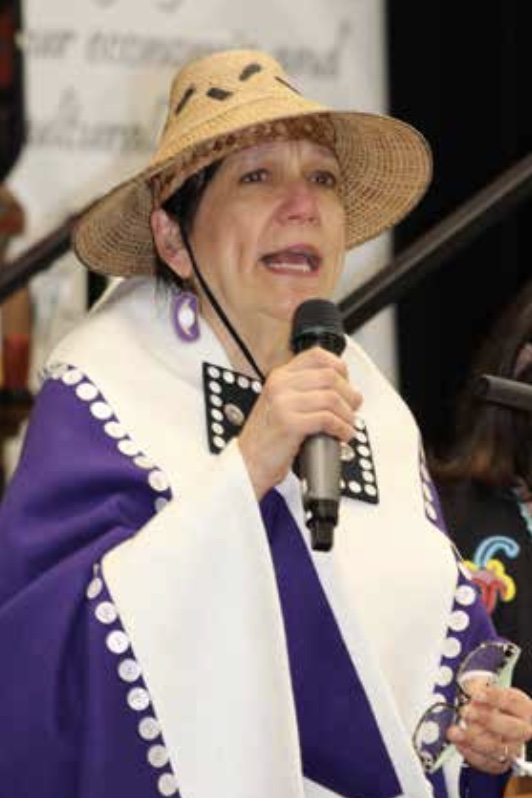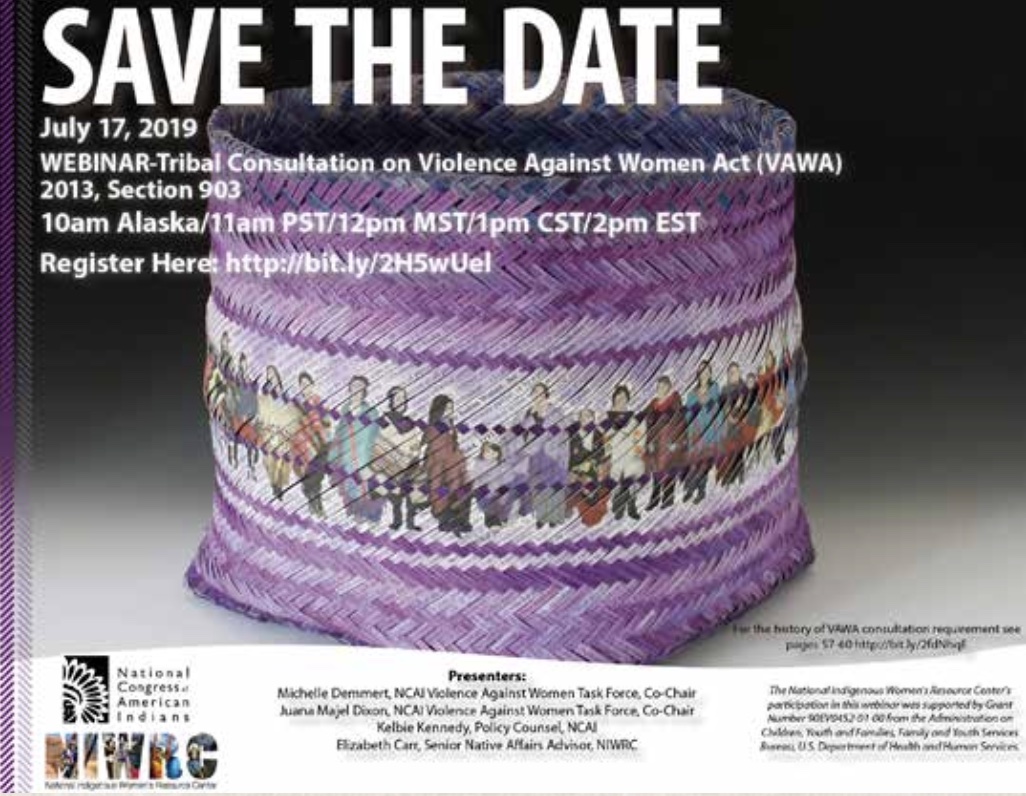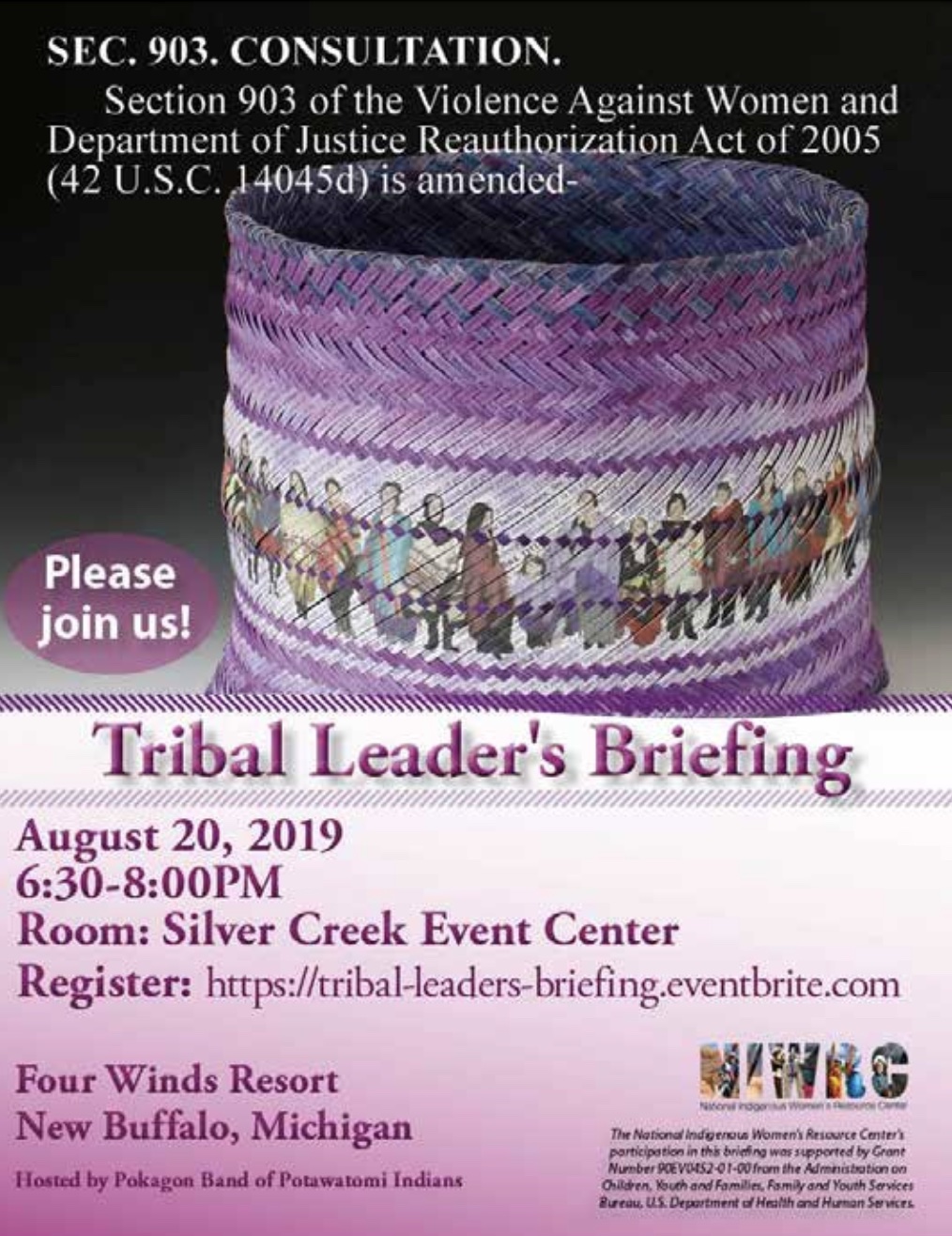2019 Annual Consultation on Violence Against Native Women
 This August 2019 consultation marks 14 years of government-to-government consultations between Indian tribes and federal departments on violence against Native women. Clearly, these annual consultations drive the federal legislative and policy reform efforts to increase safety for Native women forward. For more than a decade this nation-to- nation engagement as governments has provided an avenue for Indian tribes and the United States to discuss foundational issues preventing Indian tribes as governments from ensuring safety for women from abusers and predators.
This August 2019 consultation marks 14 years of government-to-government consultations between Indian tribes and federal departments on violence against Native women. Clearly, these annual consultations drive the federal legislative and policy reform efforts to increase safety for Native women forward. For more than a decade this nation-to- nation engagement as governments has provided an avenue for Indian tribes and the United States to discuss foundational issues preventing Indian tribes as governments from ensuring safety for women from abusers and predators.
At the 2018 consultation in Sioux Falls, SD, Indian tribes presented the legal, policy, and administrative issues preventing their governments from safeguarding the lives of Indian women. Many of the barriers identified by tribal leaders were legal ones—existing laws passed by Congress, U.S. Supreme Court rulings from decades ago, or administrative policies of federal departments. Tribal leaders highlighted priority concerns and recommendations, including the following:
- amendments to 25 USC 1304 to remove remaining jurisdictional loopholes to further the protections needed by Native women, children, and tribal personnel;
- the creation of a permanent authorization for DOJ’s Tribal Access to National Crime Information Program and opening the program to be inclusive of all Indian tribes;
- amendments to increase protections of Native women to address the crisis of missing and murdered Native women in tribal communities;
- legal barriers, in conflict with the purposes of the VAWA, preventing certain Indian tribes from protecting Native women, such as in the states of Maine and Alaska, and
- addressing disparities and inadequate funding of tribes under the Crime Victim Fund and the Family Violence Prevention and Services Act.
This year’s consultation occurs at a time when both the VAWA and the Family Violence Prevention Services Act have expired and must be reauthorized in 2019. It is also during a time when other significant legislation to address the safety of Native women is pending such as the amendment to the Crime Victim Fund to create a “permanent” dedicated funding stream for Indian tribes in the SURVIVE Act introduced in both the Senate and House.
“Under the consultation mandate, the federal departments—Departments of Justice, Health and Human Services, and Interior—must each consult annually with Indian nations on issues concerning the safety of Indian women. The annual consultation is to provide the vehicle and central point for the exchange between Indian tribes and these three federal departments.” —Juana Majel, Co-Chair, NCAI Task Force on Violence Against Women.
“While federal departments and agencies can also consult on their particular issues, these three departments are mandated by Congress to consult. The statute is clear. It states that during the annual consultation, “the Secretary of the Department of Health and Human Services and the Attorney General shall solicit recommendations from Indian tribes.” In 2013 the Secretary of the Interior was added as a mandated participating federal agency. While these federal departments also consult on their particular issues, these departments are mandated to consult specifically on issues listed under the VAWA statute. This is essential because perpetrators understand the loopholes in state and federal laws and evade accountability. Creating some of the deadliest situations in the United States. It is essential that all three of the central agencies be at the consultation table. Why? Because addressing this crisis is not piecemeal. The silos federal departments create to run their departments do not benefit the tribal communities these programs were designed to serve. It will take extensive coordination to remove the legal and policy barriers and implement the lifesaving reforms of VAWA.”—Michelle Demmert, Co-Chair, NCAI Task Force on Violence Against Women.
To continue to increase protections for Native women, Indian nations need to continuously identify the roadblocks and solutions that will allow tribal nations as governments to protect women. This section of Restoration is offered to assist tribal leaders and the movement in preparing for the 2019 consultation.
Progress Made Based on the VAWA Annual Consultation Process
The 2019 VAWA consultation marks 14 years of annual consultations between Indian tribes and federal departments on issues concerning violence against American Indian and Alaska Native women. This consistent dialogue between tribal governments and the federal departments on the highest priorities to
be addressed has created a steady process of change addressing foundational issues and also changes to increase safety in the day-to-day lives of Indian women.
“Reforms under VAWA are a process, and each amendment is a stepping stone toward our goal of strengthening Indian tribal authority to protect their women citizens. With each amendment, we see movement toward providing more resources for Indian tribes as governments to address violence against women. The speed in reforming the antiquated system under which we live must increase so that Native women can live free from violence.”—Lucy Simpson, Executive Director, NIWRC
VAWA 2005 Tribal Consultation Mandate
(a) In General—The Attorney General shall conduct annual consultations with Indian tribal governments concerning the federal administration of tribal funds and programs established under this Act, the Violence Against Women Act of 1994 (Title IV of Public Law 103-322; 108 Stat. 1902), and the Violence Against Women Act of 2000 (division B of Public Law 106-386; 114 Stat. 1491).
(b) Recommendations—During consultations under subsection (a), the Secretary of the Department
of Health and Human Services and the Attorney General shall solicit recommendations from Indian tribes concerning—
(1) administering tribal funds and programs;
(2) enhancing the safety of Indian women from domestic violence, dating violence, sexual assault, and stalking; and
(3) strengthening the federal response to such violent crimes.
Consultation 2006-2018
Since 2006, tribal leaders have raised at the annual consultation the most severe roadblocks impacting the ability of Indian tribes to protect women. The barriers identified are often legal ones—existing laws passed by Congress, U.S. Supreme Court rulings from decades ago, or administrative policies of federal departments. Removing these barriers identified by tribal leaders has required ongoing discussions and national advocacy over many years.
Changes to federal law and policies are complicated due to the layers of federal Indian law. Addressing many of these barriers requires Congressional action that can occur through changes to federal law and at times budget appropriations. And some obstacles do not require Congressional action and can be made by administrative action of a federal department through changes to policies.
The amendment under VAWA 2000 increasing the amount of the dedicated tribal fund to 10% required amending the original amount of 4% under VAWA of 1995. The creation of a separate tribal title under VAWA in 2005 required amending VAWA 2000. The return of criminal jurisdiction to Indian tribes in cases of domestic violence made by Congress under VAWA 2013 required amending the Indian Civil Rights Act and other federal laws. And the inclusion of a dedicated tribal funding stream under the 2018 Congressional Budget Appropriations Act temporarily allows Indian tribes access to the Crime Victim Fund.
Understanding the relationship of this consultation process to the major victories of more than a decade is important in preparation for the 2019 annual consultation. Consultation provides a vehicle for tribal governments to state their concerns, recommendations, and support or opposition to reforms under consideration. The reports from the annual consultation give a detailed record from Indian tribes on Congressional actions needed to increase the response of tribal governments to violence against Indian women. The annual government-to-government consultation provides a process for the progress to continue until safety and justice for Native women are achieved.
VAWA 2013 Amendments Mandate an Annual Report to Congress
“The Attorney General submits to Congress an annual report that:
- Contains the recommendations made by Indian tribes during the year covered by the report;
- Describes actions taken during the year to respond to recommendations made during the year or a previous year; and
- Describes how the Attorney General will work in coordination and collaboration with Indian tribes, the Secretary of Health and Human Services, and the Secretary of the Interior to address the recommendations.”
Victories from Recommendations Raised by Indian Tribes During Consultation
Issues raised by tribal leaders during annual VAWA mandated consultation have resulted in steps forward
to increase the safety of Native women. These gains were won based on the hard work of the national movement over many decades. The increased resources have provided the support needed to implement the necessary changes, and other changes recognize the cultural difference between tribal and non-tribal services. Listed below are examples of key changes since the annual consultation was mandated by VAWA in 2005. The challenge to our movement, tribal leaders and federal departments is to continue the forward direction of prior consultations and uphold the government-to- government consultation mandate.
2007 OVW Policy Change—Allowing children to be present at OVW-funded events.
2010 Congressional Act—Increase in sentencing limitation on tribal courts from a maximum of 1-year incarceration per offense to up to 3 years for a single conviction under the Tribal Law and Order Act amending the Indian Civil Rights Act.
2011 DOJ Policy Change—28 Indian tribes allowed direct access to National Crime Information Center through the USDOJ.
2013 Congressional Act—Return of jurisdiction over specific non-Indian domestic violence abusers and increase in funding for the tribal coalition grant program.
2015 State of Alaska Policy Change—The Alaska Attorney General published a formal opinion concluding that federal law preempts the Alaska state order of protection registration law and that local and state law enforcement must enforce tribal orders of protection as a result of DOJ action.
2015 DOJ Policy Change—Launch of the Tribal Access Program (TAP) providing Indian tribes access to submit and obtain criminal and civil information into the National Crime Information Center databases.
2016 OVW Administrative Response—OVW coordinated listening session with Alaska Native villages attended by DOJ, HHS, and DOI held in Fairbanks, Alaska.
2018 Congressional Budget Appropriations—Funding appropriated for a dedicated tribal victims of crime program including services for domestic violence and sexual assault victims.
Preparation for Consultation at the Tribal, Regional and National Levels
The NCAI Task Force since the first consultation in 2006, has assisted Indian tribes in preparing for the consultation. The Task Force organizes a national webinar to summarize key national concerns and emerging issues for tribal leaders to consider in their preparation. It also coordinates a preparatory caucus for tribal leaders and representatives during which tribal leaders receive a briefing of priority issues and time to discuss their specific concerns and recommendations for the consultation the following day. This year the tribal leaders briefing and caucus will be held Tuesday, August 20, 6:30-8 PM, at the Silver Creek Room at the Four Winds Resort, in New Buffalo, Michigan. Following each year’s caucus, a list of the concerns and recommendations summarizing the priority issues is developed and provided to OVW as NCAI’s formal written statement.
summarize key national concerns and emerging issues for tribal leaders to consider in their preparation. It also coordinates a preparatory caucus for tribal leaders and representatives during which tribal leaders receive a briefing of priority issues and time to discuss their specific concerns and recommendations for the consultation the following day. This year the tribal leaders briefing and caucus will be held Tuesday, August 20, 6:30-8 PM, at the Silver Creek Room at the Four Winds Resort, in New Buffalo, Michigan. Following each year’s caucus, a list of the concerns and recommendations summarizing the priority issues is developed and provided to OVW as NCAI’s formal written statement.
As in past years, this Restoration provides a review of previous concerns and recommendations made by tribal leaders addressing the three broad statutory areas identified for consultation, and any pending legislation addressing the concerns. This section also references where relevant the tribal provisions contained in the Tribal Title and other federal statutes.
The Federal Response to the Mandate of VAWA 2005 for Annual Consultation
Since the first consultation in 2006 the VAWA mandated consultation process organized by OVW has improved. Many of these improvements were mandated by the VAWA of 2005 and the additional amendments under VAWA 2013. In general, the tribal concerns focus on maintaining the government-to-government relationship of the annual consultation.
the additional amendments under VAWA 2013. In general, the tribal concerns focus on maintaining the government-to-government relationship of the annual consultation.
Tribal leaders, during consultations, have raised specific concerns and recommendations to maintain the government-to-government context of the consultation. Tribal leaders have raised consistently that the consultation is a government-to-government process and a time for tribal leaders to present the concerns and recommendations of their respective nations regarding the three broad categories stated under the statute. Tribal leaders attend with authority to represent their specific Indian tribe as a government, as do federal representatives in their capacity as federal employees. All other comments and discussion fall outside the government-to-government dialogue.
The concerns previously raised have included the following:
- Consultation is not the time for federal presentations to provide training and education.
- Framing papers developed by the federal agencies seeking a response from tribal leaders should be distributed no less than one month before the consultation if not sooner.
- The consultation agenda should reflect a government-to-government relationship and should not be open to the public for comment or dialogue. In 2018, OVW opened the consultation process to statements by non-profit organizations. OVW justified these statements by allowing them to occur at the end of the consultation. This opening of consultation violates the government-to-government mandate. The full agenda should be dedicated to fulfilling the statutory mandates of VAWA 2005 and VAWA 2013.
- The consultation statute mandates the Attorney General, Secretary of HHS, and DOI attend the consultation, and in both 2017 and 2018, the top leadership of these Departments did not attend the consultation. While attendance by federal leadership to make remarks is important it severely limits the government-to-government engagement.





